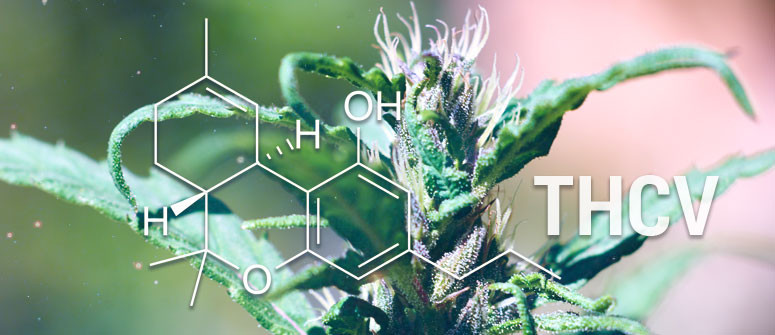What is THCV (tetrahydrocannabivarin)

Read this article on CannaConnection to see how THCV interacts with our body, and the medical potential behind this cannabinoid found in cannabis plants.
Cannabis contains many different compounds. Some of these compounds have received a lot of media attention, especially THC and CBD, and are the focus of a lot of new research designed to help us understand cannabis and its role as both a recreational substance and a medicine.
But what about the other cannabinoids found in cannabis? In this article, we take a look at THCV, a cannabinoid that is often overshadowed by THC and CBD but is just as interesting in how it interacts with our bodies. We’ll show you exactly what THCV is, how it interacts with our body, and the medical potential behind it.
WHAT IS THCV?
Tetrahydrocannabivarin, or THCV, is one of the many cannabinoids found in cannabis. As its name suggests, THCV is very similar to THC in terms of molecular structure, but has it’s own unique effects on the body.
When we consume cannabis (either by smoking, vaping, or eating it) the cannabinoids found in cannabis activate certain receptors in our body (known as CB1 and CB2). These receptors form part of the endocannabinoid system (or ECS).
The ECS is involved in mediating a variety of body functions and plays an important role in managing appetite, mood, memory, and more. It is also capable of producing cannabinoids on its own.
Cannabinoids produced naturally by the ECS are known as endocannabinoids while those found in the cannabis plant are technically referred to as phytocannabinoids.
THCV, unlike CBD, is a psychoactive compound, meaning it produces a psychoactive “high” when introduced into our bodies. This high is usually described as a stimulating, uplifting buzz.
THCV is also capable of intensifying the effects of THC in large doses.
DOES THCV HAVE MEDICAL EFFECTS?
While THCV may not get as much attention as other cannabinoids (including CBD and THC), it is showing some promising medical potential.
Arguably the biggest medical benefit THCV has to offer is its ability to help in the treatment of diabetes. Below we’ll take a closer look at how THCV can help to treat type 2 diabetes, and we’ll also share some other, lesser researched medical uses for this cannabinoid.
THCV AND DIABETES

Type 2 diabetes is a metabolic disorder that is primarily caused by obesity. It causes high blood sugar, insulin resistance, and relative lack of insulin, leaving patients with an increased risk of heart disease, strokes, blindness (caused by degradation of the retina), kidney failure, and poor blood flow to the limbs.
THCV is showing enormous potential in helping to control glycemic levels in patients with type 2 diabetes.
A study published in the journal Diabetes Care in 2016 investigated how both THCV and cannabidiol affected glycemic and lipid parameters in diabetes patients.[1]
The randomized, double-blind, placebo-controlled study, involved 62 patients with non insulin-treated type 2 diabetes The patients were given five different treatments (a placebo, CBD, THCV, a 1:1 mix of both CBD and THCV, and a 20:1 mix of CBD to THCV) for 13 weeks.
The study found that THCV significantly decreased fasting plasma glucose levels and improved pancreatic cell function, while the combination CBD-THCV treatments had no significant effect on patients.
Another study, published in Nutrition and Diabetes in 2013, also found that THCV may be a successful treatment for glucose intolerance caused by obesity. Glucose intolerance is often a precursor to diabetes.[2]
The study, lead by researchers at Clore Laboratory at the University of Buckingham, studied the effects of THCV on both dietary-induced and genetically obese mice.
The study found that THCV treatments lowered glucose intolerance in genetically obese mice while simultaneously improving glucose tolerance and insulin sensitivity in the dietary-induced obese mice.
The study also found that THCV produced an early and transient increase in energy expenditure. Both of these studies make a strong case for the role this cannabinoid may play as a treatment of type 2 diabetes.
OTHER MEDICAL USES FOR THCV
Apart from showing promise in the field of type 2 diabetes treatment and management, THCV may also play an important role in the management of a variety of other conditions.
For example, some experts claim THCV can help to suppress appetite
Bonni Goldstein, medical director at Canna-Centers, explained that THCV has the ability to block CB1 receptors in our brain when taken in small doses. When doing so, it was able to increase weight loss, lower body fat levels, and increase energy expenditure.
In these small doses, THCV tends to have opposite effects to THC. In higher doses, however, it binds to CB1 receptors and produces strong psychoactive effects.
Similar to other cannabinoids, THCV has also been rumored to help manage tremors and improve motor control and the effects of brain lesions caused by Alzheimer's disease.
It is also said to curb anxiety without suppressing emotions (a common side effect of many regular anxiety medication) and even stimulate bone growth.
However, more research into this area is needed to make solid conclusions about how THCV may help to treat this condition.
DOES THCV PRODUCE ADVERSE EFFECTS?
THCV hasn’t been studied in too much detail, and not a lot is known about its possible side effects.
When smoked, patients need to be aware of the obvious and well-researched health risks of smoking cannabis.
Secondly, it’s important to note that THCV is a psychoactive cannabinoid. In high doses, it binds to the CB1 receptors to our brains to produce a distinct “high.”
Due to it’s different chemical make up, the psychoactive effects of THCV are said to be much different to those of THC, characterized by a strong, uplifting cerebral buzz.
When taken in large doses THCV is almost twice as potent as THC, but produces psychoactive effects that last only about half the amount of time than those produced by THC.
HOW TO ADMINISTER AND DOSE THCV
As with any other kind of medical marijuana, cannabis or cannabis products that are rich in THCV can be smoked, vaporized, or eaten.
Smoking is a very common way of administering medical and recreational marijuana. However, the effects of smoking cannabis have been well-researched and are known to cause a variety of health risks. Hence, it is not a suitable method for medical patients.
Vaporizing has been extremely popular in the last years for its ability to offer an experience similar to smoking without the health risks. Vaporizers are designed to use heat to extract the key compounds from cannabis flower or concentrates without actually combusting any material. This means users don’t actually inhale any carcinogenic smoke like when smoking a joint, blunt, or bong.
Another way to administer medical cannabis is via edibles. These are snacks or meals prepared with cannabis infused cooking oils or butter in order to infuse a dish with cannabinoids such as THC, CBD, and THCV.
As THCV hasn’t been as well researched as CBD, THC, or other cannabinoids, it still lacks standardized guidelines for dosing.
WHERE TO FIND THCV
THCV is present in almost all cannabis plants, sometimes in very high percentages. Some cannabis varieties from Asian regions (such as China, India, Nepal, Thailand, Afghanistan, and Pakistan), for example, have been found to have a THCV concentrations of over 50%.
Unfortunately, many of the cannabis strains and products available through legal markets today have not been bred/produced to be specifically high in THCV.
For now, any patient looking for high concentrations of THCV should look for landrace strains from Africa and the regions mentioned above, or talk directly to a bud tender to find a product suited to their needs.
THCV: A STEP CLOSER TO UNDERSTANDING CANNABIS
So, there you have it; a detailed look at THCV and how it affects our bodies.
Remember that all the resources in this article have been compiled for informational purposes only. If you’re interested in the medical benefits of cannabis, make sure to consult a medical professional.
- ^ NCBI, Efficacy and safety of cannabidiol and tetrahydrocannabivarin on glycemic and lipid parameters in patients with type 2 diabetes: a randomized, double-blind, placebo-controlled, parallel group pilot study., retrieved January-15-2019
Link - ^ NCBI, The cannabinoid Δ9-tetrahydrocannabivarin (THCV) ameliorates insulin sensitivity in two mouse models of obesity, retrieved January-15-2019
Link




